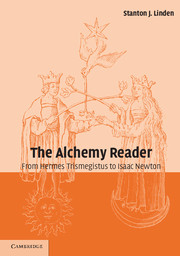Book contents
- Frontmatter
- Contents
- List of illustrations
- Acknowledgments
- List of abbreviations
- Illustrations
- Introduction
- Part I Ancient texts
- Part II Islamic and medieval texts
- Part III Renaissance and seventeenth-century texts
- 18 PARACELSUS (1493–1541): From Of the Nature of Things and Paracelsus His Aurora
- 19 FRANCIS ANTHONY (1550–1603): Aurum-Potabile: or the Receit of Dr. Fr. Antonie
- 20 MICHAEL SENDIVOGIUS (1566–1636 or 1646): From A New Light of Alchymie and A Dialogue between Mercury, the Alchymist and Nature
- 21 ROBERT FLUDD (1574–1637): From the Mosaicall Philosophy
- 22 GABRIEL PLATTES (first half of seventeenth century): A Caveat for Alchymists
- 23 JOHN FRENCH (1616?–1657): Preface to The Divine Pymander of Hermes Mercurius Trismegistus in XVII Books
- 24 GEORGE STARKEY/EIRENAEUS PHILALETHES (1628–1665?): The Admirable Efficacy, and almost incredible Virtue of true Oyl; From An Exposition Upon Sir George Ripley's Epistle to King Edward IV
- 25 ELIAS ASHMOLE (1617–1692): From the “Prolegomena” to the Theatrum Chemicum Britannicum
- 26 ROBERT BOYLE (1627–1691): From An Historical Account of a Degradation of Gold Made by an Anti-Elixir: A Strange Chymical Narative
- 27 SIR ISAAC NEWTON (1642–1727): The Key (Keynes MS 18); The Commentary on the Emerald Tablet (Keynes MS 28)
- Glossary
- Bibliography
- Index
23 - JOHN FRENCH (1616?–1657): Preface to The Divine Pymander of Hermes Mercurius Trismegistus in XVII Books
Published online by Cambridge University Press: 05 October 2014
- Frontmatter
- Contents
- List of illustrations
- Acknowledgments
- List of abbreviations
- Illustrations
- Introduction
- Part I Ancient texts
- Part II Islamic and medieval texts
- Part III Renaissance and seventeenth-century texts
- 18 PARACELSUS (1493–1541): From Of the Nature of Things and Paracelsus His Aurora
- 19 FRANCIS ANTHONY (1550–1603): Aurum-Potabile: or the Receit of Dr. Fr. Antonie
- 20 MICHAEL SENDIVOGIUS (1566–1636 or 1646): From A New Light of Alchymie and A Dialogue between Mercury, the Alchymist and Nature
- 21 ROBERT FLUDD (1574–1637): From the Mosaicall Philosophy
- 22 GABRIEL PLATTES (first half of seventeenth century): A Caveat for Alchymists
- 23 JOHN FRENCH (1616?–1657): Preface to The Divine Pymander of Hermes Mercurius Trismegistus in XVII Books
- 24 GEORGE STARKEY/EIRENAEUS PHILALETHES (1628–1665?): The Admirable Efficacy, and almost incredible Virtue of true Oyl; From An Exposition Upon Sir George Ripley's Epistle to King Edward IV
- 25 ELIAS ASHMOLE (1617–1692): From the “Prolegomena” to the Theatrum Chemicum Britannicum
- 26 ROBERT BOYLE (1627–1691): From An Historical Account of a Degradation of Gold Made by an Anti-Elixir: A Strange Chymical Narative
- 27 SIR ISAAC NEWTON (1642–1727): The Key (Keynes MS 18); The Commentary on the Emerald Tablet (Keynes MS 28)
- Glossary
- Bibliography
- Index
Summary
John French, holder of degrees from Oxford University (BA 1637, MA 1640), was a Paracelsian physician who practiced his profession with the Parliamentary army during the Civil War. He wrote the popular Art of Distillation; or, a treatise of the choicest spagyricall preparations that appeared in several editions beginning in 1651, and another treatise on medicinal spas in Yorkshire. Besides espousing Paracelsian iatrochemistry, French's works often reveal a strong mystical and millenarian emphasis, along with a bias against the “tyranny” of Aristotle and Galen. French was also a notable translator of alchemical and medical works; we have already seen that A New Light of Alchymie, the Sendivogian work included in this collection, was “faithfully translated out of the Latin into the English tongue. By J. F. M. D.”
Further confirmation of French's belief in the truth of alchemy appears in his brief address “To the Reader,” prefixed to the first edition of John Everard's English translation of The Divine Pymander of Hermes Mercurius Trismegistus, published in 1650. He categorically affirms the authenticity of the translation's original, which can “justly challenge the first place for antiquity, from all the Books in the World, being written some hundreds of yeers before Moses his time.” French's assertion appeared nearly forty years after Isaac Casaubon's correct dating of the Hermetic writings. The text of French's preface is from the 1650 edition of The Divine Pymander.
- Type
- Chapter
- Information
- The Alchemy ReaderFrom Hermes Trismegistus to Isaac Newton, pp. 208 - 210Publisher: Cambridge University PressPrint publication year: 2003



